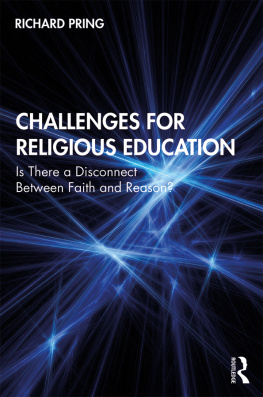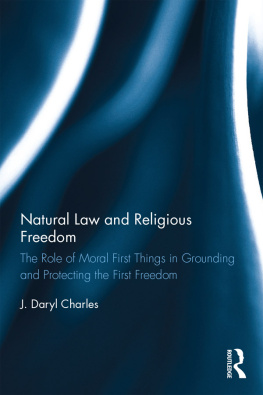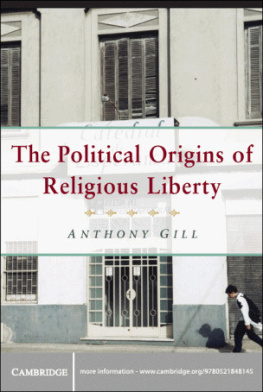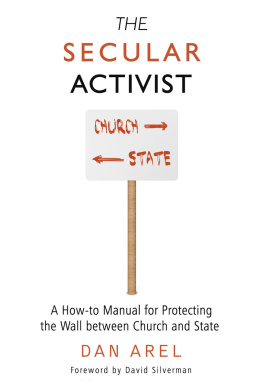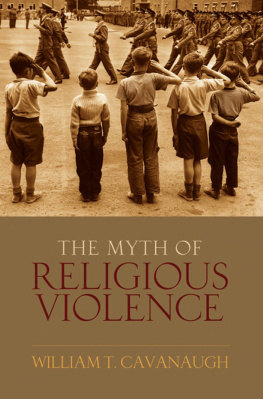Jacques Berlinerblau - How to be secular: a call to arms for religious freedom
Here you can read online Jacques Berlinerblau - How to be secular: a call to arms for religious freedom full text of the book (entire story) in english for free. Download pdf and epub, get meaning, cover and reviews about this ebook. year: 2013, publisher: Mariner Books, genre: Religion. Description of the work, (preface) as well as reviews are available. Best literature library LitArk.com created for fans of good reading and offers a wide selection of genres:
Romance novel
Science fiction
Adventure
Detective
Science
History
Home and family
Prose
Art
Politics
Computer
Non-fiction
Religion
Business
Children
Humor
Choose a favorite category and find really read worthwhile books. Enjoy immersion in the world of imagination, feel the emotions of the characters or learn something new for yourself, make an fascinating discovery.
- Book:How to be secular: a call to arms for religious freedom
- Author:
- Publisher:Mariner Books
- Genre:
- Year:2013
- Rating:5 / 5
- Favourites:Add to favourites
- Your mark:
- 100
- 1
- 2
- 3
- 4
- 5
How to be secular: a call to arms for religious freedom: summary, description and annotation
We offer to read an annotation, description, summary or preface (depends on what the author of the book "How to be secular: a call to arms for religious freedom" wrote himself). If you haven't found the necessary information about the book — write in the comments, we will try to find it.
How to be secular: a call to arms for religious freedom — read online for free the complete book (whole text) full work
Below is the text of the book, divided by pages. System saving the place of the last page read, allows you to conveniently read the book "How to be secular: a call to arms for religious freedom" online for free, without having to search again every time where you left off. Put a bookmark, and you can go to the page where you finished reading at any time.
Font size:
Interval:
Bookmark:
First Mariner Books edition 2013
Copyright 2012 by Jacques Berlinerblau
All rights reserved
For information about permission to reproduce selections from this book, write to or to Permissions, Houghton Mifflin Harcourt Publishing Company, 3 Park Avenue, 19th Floor, New York, New York 10016.
www.hmhco.com
The Library of Congress has cataloged the print edition as follows:
Berlinerblau, Jacques.
How to be secular: a call to arms for religious freedom / Jacques Berlinerblau.
p. cm.
Includes bibliographical references and index.
ISBN 978-0-547-47334-5
ISBN 978-0-544-10516-4 (pbk.)
1. SecularismUnited States. 2. Freedom of religionUnited States. 3. United StatesReligion. 4. Church and stateUnited States. I. Title.
BL2747.8.B477 2012
211'.6dc23
2012014226
Cover design by Patrick Barry
e ISBN 978-0-547-51828-2
v4.1017
To the memory of Pasquale Spadavecchia (19312008)
Country Doctor. Philosopher. Gentleman.
You had religious education?
None that you could take seriously.
I pity you. So flatly stated that he might as well have been telling me the time.
Yes, you feel sorry for me?
Secular dont know what they are living for.
I can see how to you it might look that way.
Secular are coming back. Jews worse than you.
Really? How much worse?
I dont like to say even.
What is it? Drugs? Sex? Money?
Worse. Come, mister. Itll be mitzvah, mister.
If I was correctly reading his persistence, my secularism represented to him nothing more than a slightly ridiculous mistake.
P HILIP R OTH , The Counterlife
A FEW DAYS BEFORE the commemoration at Ground Zero marking the tenth anniversary of the World Trade Center tragedy, an article appeared on the front page of the New York Times titled Omitting Clergy from 9/11 Ceremony Prompts Protest. The protesters in question were incensed over Mayor Michael Bloombergs decision to prohibit religious officials from speaking at the memorial honoring those who perished in the attacks.
Uproar aside, the decision was entirely consistent with the citys usual practice. In the past, services on this day of national mourning did not typically feature official representatives of religious groups. That clerics were not invited to participate on September 11, 2011, was neither unprecedented nor unusual. But leaders of the Christian Right suddenly deemed this arrangement unacceptable.
Richard Land, a major figure in the ultraconservative and highly influential Southern Baptist Convention, was quoted in the article as saying, Were not France... Mr. Bloomberg is pretending were a secular society, and we are not.
Doing its own reporting on the growing controversy, the Christian Century cited the president of the Institute on Religion and Democracy, who charged that New Yorks mayor was ignoring most Americans and most New Yorkers by pretending religion is unimportant.
As the controversy crescendoed, the mayors detractors certainly had reason to believe that they might prevail. After all, in recent decades the Christian Right had been routing American secularism (a term that, as we shall see, has been defined, derided, used, and abused in a bewildering variety of ways). The growing influence of this movement was evident in the manner in which faith and piety had come to permeate the rhetoric of politicians and, ultimately, law and policy. Reproductive rights had been checked across the countryso much so that legal abortions are extraordinarily difficult to procure in many states of the Union. Sciences role in shaping national dialogue on questions such as the teaching of evolution or the threat of climate change had been degraded. American public education had been challenged by attempts to de-secularize the curriculum or even remove students from its institutions via voucher programs or homeschooling.
Now the conservative Christian outrage machine was revving and whirring again. And in New York City, for the love of God! This must have seemed like a heaven-sent opportunity for the assembled activists. If the Christian Right could make it unsecular there, they could make it unsecular anywhere! Imagine the mayor of the most secular city in America, and possibly the world, being forced to bend to the will of a few Bible-thumpin pastors from the boonies!
That did not come to pass. In the face of a brutal battering from the media, Bloomberg held his ground, often with truculence. The fact that he had always maintained cordial relations with the citys diverse communities of faith certainly strengthened his position. The ceremony proceeded solemnly and without incident. The critics quietly decamped from this theater of the culture wars. In all likelihood theyll be back for another go.
This book is about the recent crackup of American secularism and the therapeutic steps required for its rehabilitation. In understanding how the patient became institutionalized (or, more precisely, de-institutionalized) we will need to make sense of its complex historical past. In order to secure the future of secularism we will need to understand what secularism is and, more important, what it is not. According to its enemies, secularism is akin to atheism, hatred of religion, anti-Americanism, andwhy not?radical jihadism.
The stakes are very high. Were secularism to completely collapse, the country might become the type of Christian nation that the New York protesters hope (and pray) for. In the mid-twentieth century, the U.S. Supreme Court assiduously labored to purge any such possibility from our political system. Yet the form of secularism they abided by has fallen upon some very difficult times. New ideas, new energy, and most of all new people are needed to resurrect it in America today.
To a large extent, the ceremony of September 11, 2011, exemplified the possibilities of a new vision for secular America, wherein both freedom of and freedom from religion are granted as much space as possible. Under the Bloomberg protocols, no state-sanctioned clergy or prayer was included during the memorial. Yet those citizens who wished to express their faith were completely at liberty to do so.
President Obama opened his remarks by quoting from the Psalms.
Yet some of the speakers said not a word about God. Perhaps they refrained because they wished to keep their faith to themselves. Or perhaps they did not believe in God. One imagines that Bloombergs no-clergy directive offered these mourners one less distraction on a day of sorrow.
Still others invoked religion with moderation, dignity, and restraint, which are hallmarks of the secular worldview. One mourner, Debra Epps, noted that her brothers name was imprinted on the 9/11 memorial next to that of another victim, Wayne Russo. The men had sat next to each other at work. The family of the latter had called and asked for permission for their names to be enshrined side by side on the monument. Christopher would have loved knowing, Ms. Epps explained, as she closed a short speech otherwise light in faith-based themes, that the love he freely gave to others was given back to us in his name. Thank you, and I bid you Gods speed.
Secularism is the handy one-word distillation for all that is wrong in the modern world. Consumerism, divorce, drugs, Harry Potter, prostitution, Twitter, relativism, Big Brother, lack of moral compass, lack of community cohesion, lack of moral values, vajazzlingall can be lumped together and explained by the word secular, a kind of contemporary contraction of heathen and barbarian, with undertones of greed, perfidity, and vulgarity.
C ASPAR M ELVILLE , Mix and Match Secularism
Next pageFont size:
Interval:
Bookmark:
Similar books «How to be secular: a call to arms for religious freedom»
Look at similar books to How to be secular: a call to arms for religious freedom. We have selected literature similar in name and meaning in the hope of providing readers with more options to find new, interesting, not yet read works.
Discussion, reviews of the book How to be secular: a call to arms for religious freedom and just readers' own opinions. Leave your comments, write what you think about the work, its meaning or the main characters. Specify what exactly you liked and what you didn't like, and why you think so.

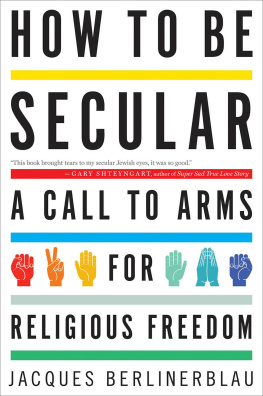

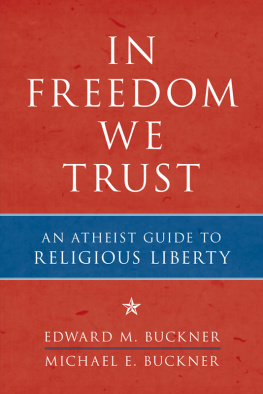

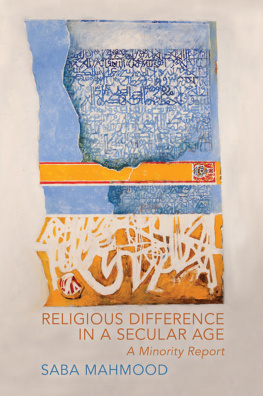
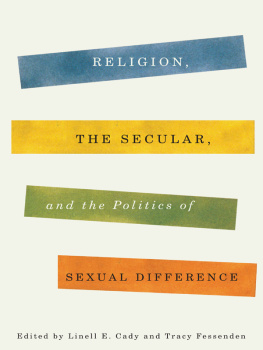
![Blackford - Freedom of religion [and] the secular state](/uploads/posts/book/167779/thumbs/blackford-freedom-of-religion-and-the-secular.jpg)
